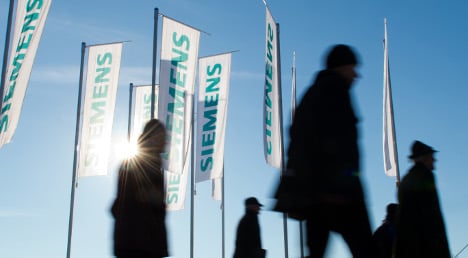The company is aiming for voluntary redundancies and to redeploy some staff within the vast conglomerate, which makes products from gas turbines to rail equipment to health care goods.
“The ongoing and planned workforce adjustments in the context of Siemens 2014 are about 15,000 positions worldwide, of which about 5,000 are in Germany,” the Munich-based company said in a statement.
The ongoing “Siemens 2014” drive in total aims to save more than €six billion.
The company in July appointed Joe Kaeser as the new chief executive, replacing ousted Peter Löscher, days after Siemens had announced its second profit warning in two months.
When Kaeser took over at the helm of Siemens, he stressed that the company was “certainly not in crisis, nor is it in need of major restructuring”.
“However we’ve been too preoccupied with ourselves lately and have lost some of our profit momentum vis-a-vis our competitors,” he said in late July, vowing to get Siemens “back on an even keel.”
Of the job cuts in Germany, 2,000 positions will be slashed in the company’s industry division, 1,400 in energy, 1,400 in infrastructure and cities and 200 in the corporate division, the spokesman said.
The steps had been “discussed with all those concerned”, with about half the redundancies to take effect in 2013 and the rest by the end of 2014, he said.
Siemens said the cost-cutting plans were not new, just the number of layoffs which resulted from them, and that the job losses had been discussed with workers’ representatives.
“We are sticking to the rule: first we speak with the employees, then we go public,” the company said in its statement.
Earlier on Sunday, the Welt am Sonntag newspaper had quoted analysts as expecting about 10,000 job cuts next year.
Siemens has about 370,000 employees worldwide, including 119,000 in Germany.
During the leadership change at Siemens, even Chancellor Angela Merkel, via her spokesman, had commented, saying she viewed the Siemens group as a “flagship” of the German economy and a company which needed to “return to calm waters”.
Shortly after announcing the changes, the company released its results for its fiscal third quarter, posting a 43-percent jump in net profit to €1.1 billion, mostly due to the spin-off of lighting company Osram.
Nevertheless profit from continuing operations fell 13 percent in the April to June period, to €1.0 billion, while sales dropped two percent to €19.2 billion, hit by its wind energy activities in the United States.
Löscher, who came from the US pharmaceutical company Merck to take over the reins of Siemens in 2007, had faced criticism for some time amid disappointing results, a company strategy deemed vague and missed deadlines.
READ MORE: Troubled Siemens ditches chief
AFP/jcw



 Please whitelist us to continue reading.
Please whitelist us to continue reading.
Member comments